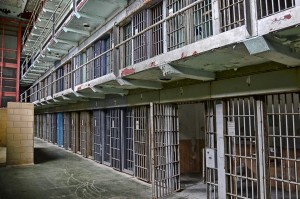Cruel And Unusual Punishment At A Major Federal Prison
No electricity. No heat. No medications. How did normal procedures break down so quickly?

(Photo by Bob Jagendorf/Getty)
The Eighth Amendment was enacted to protect prisoners from cruel and unusual punishment. Yet even with that protection in place, things in prison go wrong and when they do, conditions here can get as bad as the gulags of Russia or hell holes of North Korea.
The Metropolitan Detention Center (MDC) in Brooklyn is a federal prison located on a slip of land between the Gowanas Canal and a raised section of the Brooklyn-Queens Expressway.

Navigating Financial Success by Avoiding Common Pitfalls and Maximizing Firm Performance
Prisoners there, yet to be found guilty and awaiting trial, were subjected last week to conditions rivalling the most vile prisons in the world.
The MDC was without light, heat, medical treatment, counsel visits, electricity, and supplies for a week, yet only, little by little, did the severity of the situation become known.
After receiving repeated requests for entry to examine the facility on Friday, February 1, prison officials were ordered by the court to permit access to local politicians and attorneys representing federal public defenders and the U.S. prosecutors office.
What they found was horrific: Men locked in cells without light, not permitted to go to the mess hall for food, barred from receiving visitors or even calling them; mentally ill inmates suffering with schizophrenia, bipolar ailments, and depression, deprived of their medications or if they got them, unable to decipher what pill to take because of the dark; injured inmates with sores leaking pus; bloodied sheets, unchanged.
Sponsored

Is The Future Of Law Distributed? Lessons From The Tech Adoption Curve

Early Adopters Of Legal AI Gaining Competitive Edge In Marketplace

Legal AI: 3 Steps Law Firms Should Take Now

Legal AI: 3 Steps Law Firms Should Take Now
Last week, when temperatures in New York City dropped below zero, prison cells abutting the water never got warmer than 30 degrees. No extra clothing was provided. All counsel visits were canceled and outside items like blankets from friends and family, were not permitted to be dropped off.
Prison guards were wrapped in layers to ward off the cold. Prisoners used thin blankets and towels for warmth. They hadn’t eaten a hot meal for a week nor had a clean change of underwear or socks in as long.
Inmates banged on their windows (what few there are) on Friday as friends and family along with civil-rights activists, protested outside the walls.
Defense attorneys had filed for changes in their clients’ detention conditions or requested they be removed to other facilities. Judges will hear those arguments this week and have demanded prison officials be present in court as well.
In the meantime, the prisoners toughed it out. The sick got sicker, the mentally ill worse. I remember meeting a client there once who’d been extradited from Combita, the maximum- security prison in Colombia. He described having to stand outside for hours in the cold, not having hot water, being left in an overcrowded cell for days, and not getting needed medical attention. He was grateful for having been extradited to the U.S. where, he said, prison conditions were better than in his own country. That was six years ago. He’d not be so happy to be here now.
Sponsored

The Business Case For AI At Your Law Firm


Navigating Financial Success by Avoiding Common Pitfalls and Maximizing Firm Performance
According to reports, a confluence of factors caused the breakdown of order at the MDC. First, a fire led to electrical problems. Freezing cold temperatures prevented repair, pipes burst behind walls, water leaked onto inmate beds. All went dark, then fear of security lapses compelled a total lockdown. Inmates got no information from guards and could have no contact with either family or attorneys to know when things might improve.
It took days for the outside world (even their attorneys) to grasp the gravity of the situation. Many believe prison officials purposely underplayed and even lied about how bad things were. Longtime defense attorneys were incredulous that such a breakdown could occur without immediate remediation.
Prison officials reported that the electrical problems were repaired late yesterday. But even if they have been, questions remain. How did normal procedures in a major federal prison break down so quickly? Why were no precautions in place like backup generators, provision of emergency lights, dispersal of medication, and extra clothing for inmates? Why was the enormity of the problem kept under wraps for so long? Why did it take the amassing of politicians, lawyers, and hundreds of protestors outside the facility before the electrical problems got solved?
All of this kicked off just days after the longest government shutdown in U.S. history. It’s likely there’s a connection. Federal prison guards are among the lowest paid federal employees. Their job is tough; their hours long; the rewards probably few and far between.
They had been asked to work without pay for weeks. That could cause anyone to lose patience, close an eye to work or maintenance that should have been done, or fail to observe a dangerous situation (like whatever caused the fire).
Government shutdowns cause damage. The fallout hurts those lowest on the totem pole — prison guards who can’t pay their bills and the inmates they’re forced to watch over even though they’re not being paid. Could this cause animosity? You bet.
None of it was necessary.
Toni Messina has tried over 100 cases and has been practicing criminal law and immigration since 1990. You can follow her on Twitter: @tonitamess.







